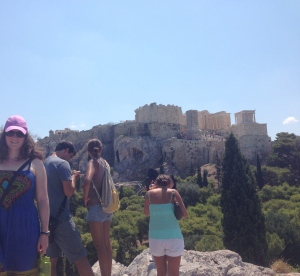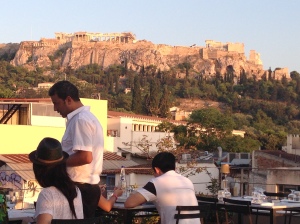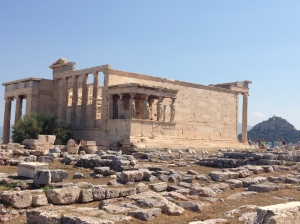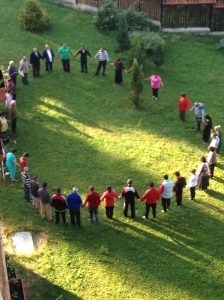Sweltering in the piercing sun on Mars Hill in Athens, Greece,

Just like Paul—minus the pink hat.
I imagined Paul’s artfully constructed speech to the philosophers gathered to hear this ‘new teaching.’ It was not difficult to imagine the spiritual inquisitiveness and intellectual pride in first century Greece from a city set in the shadow of the glorious Areopagus—or, as Paul noted, a city ‘fully of idols.’
Following the missionary steps of Paul in Greece (in an air-conditioned car) brought Paul’s church planting endeavors to a ‘grittier’ level. Somehow, I don’t think he was evangelizing to a crowd of 10, 000 via an expensive sound system and then writing supporter updates telling of mass conversions. Yes, the church was spreading, but it was through arduous traveling, persecution, jail time, jeering, disbelief, and philosophical and religious discussions. 
Today Greece—largely an Orthodox country— is in the center of Europe’s refugee crisis, while already suffering through a long-standing economic and political crisis. The Protestant church is small but active, particularly in the refugee crisis.
There are only a handful of Roma churches, and another handful of Roma in Greek churches. Many Roma communities in Greece are mired in poverty, crime, discrimination, and lack of education.
Later that same day, while munching on a Greek Gyro, I sat with a Roma evangelist(“I am not a pastor but an evangelist,” he corrected me) in Greece. George grew up without a father, but hungry for a father’s love. His mother, an uneducated woman, taught him how to beg so that they could make a living. When he was 15 years old, he put on a neck collar and pretended that he needed money for an operation—and consequently was able to earn a good amount of money.
When he eventually got married, he and his wife tried to open a small grocery store, but the endeavor failed.
“As I grew up,” George said, “sin was also growing in me.” He began gambling and doing other things, and went back to begging, with his aunt as his partner. This time, he took a cane and pretended to be a cripple. His aunt’s daughter became very sick, and both George and his aunt became convinced it was God’s judgement on their deceitful strategies while begging.
“I didn’t know what to do so I went to a certain Greek island,” George said. “There is an Orthodox tradition, that when we want to ask something from a saint, you do something for the saint. So I did penance by walking on my knees from the harbor to the church to seek the favor.”
When he returned from the island, he found out that his aunt had become a believer and began to share God’s love for him. But he didn’t listen until his niece eventually recovered and asked him to come to church.
” I went to the church and knelt. I raised my hands and cried to God. When I stood up after the prayer, I felt a lot of love and joy. And I had a lot of love for people.” A man—who converted 40 years before when a group of French Roma had come to Greece to evangelize—mentored and discipled him.
“From the very first day since I believed, in my heart there was the burden that I wanted everyone to meet Christ. God did a very big work in my life. He filled me with his love. And I wanted others to feel the same love.”
Now George and a small group of believers are fasting and praying two weekends out of a month for their neighborhood in Athens—an impoverished place riddled with violence, drugs, witchcraft, and stealing and where few children go to school.
“We believe that the neighborhood will start changing,” George said. “God encourages us and we see things happening.”
Two men, two evangelists,two different contexts and time periods within Greece, but both stories illustrate the sweat and tears necessary to evangelize and make disciples.
Paul called himself the ‘least of all the apostles,’ since Christ called him when he was persecuting the church. He attributes his apostleship—not to his education, religious training, or the convenience of being a Roman citizen—but simply by God’s grace.
And this is a conviction shared by George, a professional con-man called by Christ.
“I believe, ” George mused, “by God’s grace we can continue.”








